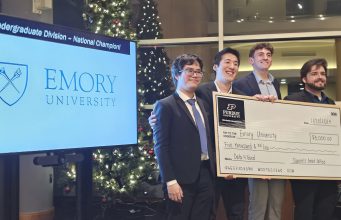
Not long after news surfaced of American Airlines’ parent company filing for bankruptcy did rumors appear about which major airline could make an acquisition play. Last week, Atlanta-based Delta Air Lines jumped to the top of that rumor list.
Such a move would make Delta, the world’s largest airline, even larger.
John Bachman of WSB-TV reports on possible price changes should a merger take place but, in talking with Ram Chellappa, a Goizueta professor with research on the airline industry and pricing, reports another merger will have a bigger impact on Atlanta passengers.
Chelleppa said a Delta-American merger wouldn’t have a significant impact on prices in Atlanta because Delta is already the largest player at Hartsfield-Jackson International Airport.
“We should be more concerned about Southwest and AirTran pricing,” he said, referring to the merger of the two low-cost careers. “That actually dictates a lot of the Delta pricing.”
But could a merger of Delta and American Airlines really fly?
“That would be a colossal merger,” said Chellappa, but added he wouldn’t say ‘no’ to such a deal getting approved by regulators because other, big airline mergers have occurred in recent history.
ABOUT THE EXPERT
Dr. Ramnath K. Chellappa joined the Goizueta Business School faculty in Fall 2005. He served on the faculty of Marshall School of Business, University of Southern California from 1997-2005, and was also the founding director of the Electronic Economy Research Lab (eBizLab) at USC. He is also affiliated with the Center for Telecom Management at USC and the Center for Research in Electronic Commerce at the University of Texas at Austin.
Chellappa’s expertise is in the field of electronic markets, pricing, digital goods and economics of information security and privacy. His research in the areas of digital product piracy has been widely published in leading journals and conferences. His recent works examine pricing in the U.S. domestic airline industry and competitive dynamics in business software industries. His research methods include analytical modeling, empirical modeling and social network analysis.
He received his PhD from the McCombs School of Business at the University of Texas in Austin in 1997 where his work resulted in the creation and scholarly definition of the term “Cloud Computing.”









